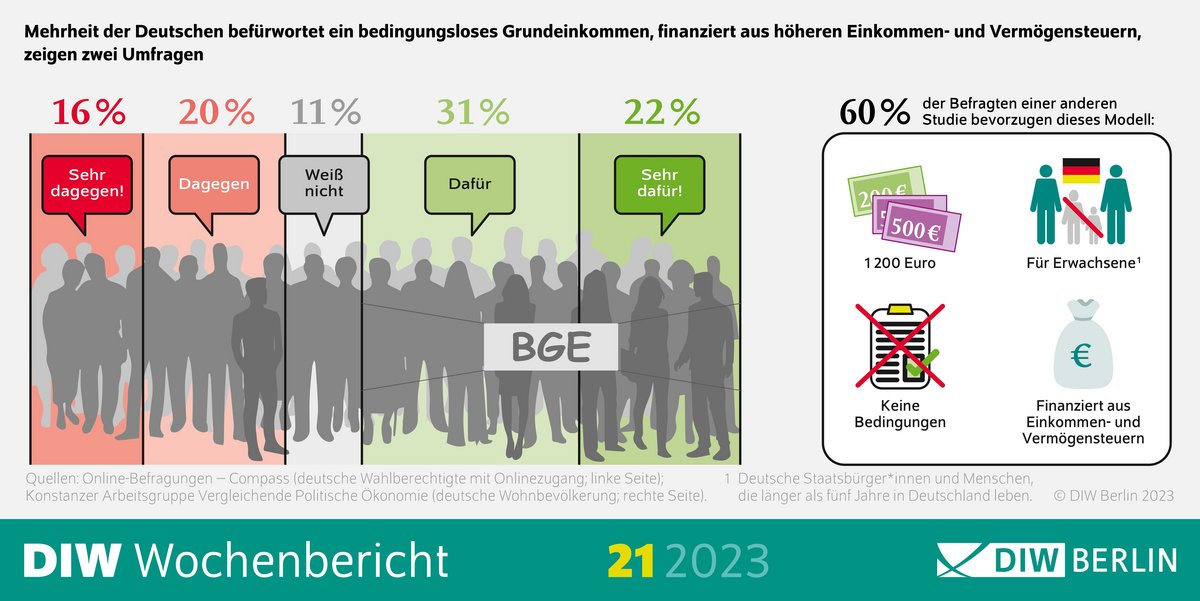
High support for universal basic income
The majority of the population in Germany supports the introduction of an unconditional basic income. The analysis of two representative studies shows that the higher the basic income, the greater the approval. As a means of financing, most respondents support an increase in income and wealth taxes.
Support for universal basic income has been relatively high for years. Particularly people with lower incomes and other economic concerns support the introduction of a universal basic income. This is the result of two representative surveys conducted and analyzed in the summer of 2022 by researchers from the Cluster of Excellence "The Politics of Inequality" at the University of Konstanz and the German Institute for Economic Research (Deutsches Institut für Wirtschaftsforschung - DIW Berlin).
The results show that the higher the level of basic income, the higher the public approval. The most popular variant is a basic income of 1,200 euros per month, which is financed by an increase in income and wealth taxes and is not tied to any conditions. On the other hand, financing the basic income through an increase in value-added tax is less popular. This is confirmed by Marius Busemeyer, Professor of Political Science and spokesperson for the Cluster of Excellence "The Politics of Inequality" at the University of Konstanz: "What is particularly striking about the results is that a universal basic income without any further conditions would be the most popular option." Adrian Rinscheid, Assistant Professor of Environmental Governance at Radboud University Nijmegen and visiting researcher at the Cluster of Excellence, adds: "Interestingly, our results show that there is indeed popular support for dedicated redistribution policies."
First analysis of the possible design of basic income
The authors of the study examined levels of approval or rejection of a universal basic income in relation to social and demographic characteristics such as age, household net income, or life satisfaction among the eligible population in Germany. It appears that younger individuals, people with low incomes or those with lower life satisfaction are more likely to support a basic income.
For the first time, the authors also analyzed the preferences of the resident population in Germany regarding the possible design of a universal basic income. They used innovative survey methods to estimate the extent to which support for a hypothetical basic income depends on certain aspects, such as the amount of the basic income and the financing. 4,500 individuals were surveyed for this purpose. "Politically, universal basic income is highly controversial, but it has enjoyed high popularity among the population for years," summarizes Jürgen Schupp, Senior Research Fellow at DIW Berlin, "There is public support for basic income, so it should be taken into account in future debates on the transformation of social systems."
Pilot project on unconditional basic income
The German Institute for Economic Research is currently conducting a three-year pilot project in cooperation with the association "Mein Grundeinkommen" and several scientific institutes to study the individual effects of a universal basic income of 1,200 euros per month. The results will be published in the summer of 2024.
This news is based on a press release of the German Institute for Economic Research (DIW Berlin).
Key Facts:
- DIW Weekly Report 21/2023: "Strong support for a universal basic income, in particular among those who would benefit" by Marius R. Busemeyer, Adrian Rinscheid, and Jürgen Schupp. German Institute for Economic Research (DIW Berlin).
- The study analyses two representative surveys from the summer 2022 on attitudes toward the amount and design of a universal basic income in Germany. The highest approval is received for a universal basic income of 1,200 euros.
- 36 percent of respondents expect to be financially better off after the introduction of universal basic income. Approval for unconditional basic income in Germany has ranged between 45 and 53 percent for years.
- Financing through higher income and wealth taxes for the rich receives the highest support, while an increase in value-added tax is unpopular.
- Marius R. Busemeyer is a Professor of Political Science at the Department of Politics and Public Administration at the University of Konstanz and speaker of the Cluster of Excellence "The Politics of Inequality."
- Adrian Rinscheid is an Assistant Professor of Environmental Governance and Politics at Radboud University Nijmegen (Netherlands) and is currently working as a visiting researcher at the Cluster of Excellence "The Politics of Inequality."
- Jürgen Schupp is a Senior Research Fellow at DIW Berlin.

